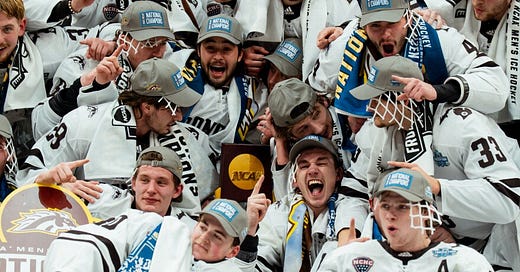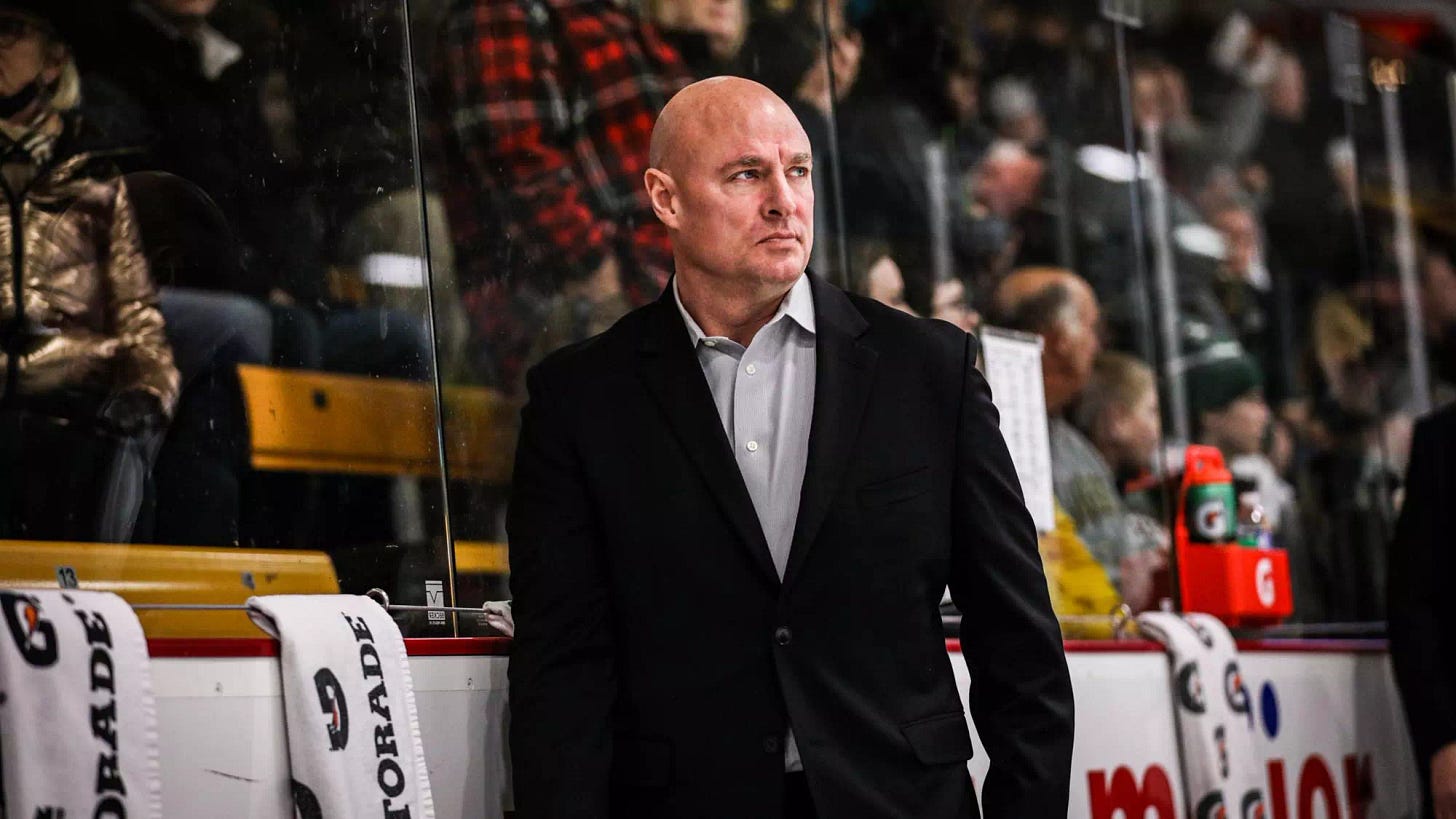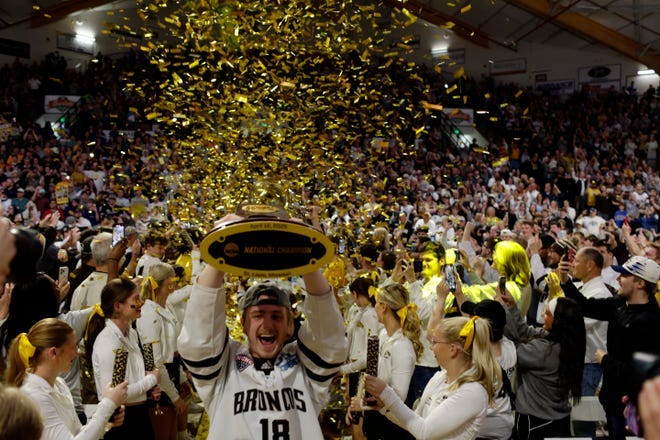Western Michigan hockey did the damn thing
In their first Frozen Four appearance, the upstart Broncos won the first NCAA title of any kind for their school since the 1960s. Here's how they got there.
As much as I tried, I couldn’t bring myself to feel sadness last Saturday.
My alma mater, Boston University, lost handily in the NCAA men’s ice hockey championship game, a 6-2 defeat that ensured that none of its trips to the Frozen Four in each of the past three years ended with a title.
Sports were not among the reasons I chose to go to BU. It hasn’t fielded a football team since 1997. Though its men’s basketball program has been a career stepping stone for several notable coaches – namely, Rick Pitino and Mike Jarvis – and has been a factory for players who later spawned NBA point guards – Kyrie Irving and Jeff Teague’s fathers both played there – it has made the NCAA Tournament just once since 2002.
There aren’t many opportunities for the Terriers to shine athletically on the national stage. That onus often falls on the men’s hockey program, so even though I usually only pay close attention to them once the NCAA Tournament starts – kind of like a Christian who only shows up to church for Christmas and Easter services – I still end up caring quite a bit about how they do once they reach the biggest stage in the sport.
My casual BU fandom, though, wasn’t why I felt oddly at peace with last Saturday’s result. It was because of the team it lost to.
Western Michigan entered the Frozen Four as the lone No. 1 seed remaining in the NCAA Tournament, but the Broncos, for all they had achieved over the previous six months, were anything but a favorite. They were in the Frozen Four for the first time ever and on their way to a title, they had to defeat Denver, which had won two of the past three championships and whose 10 titles are the most ever for a Division I program, and BU, which has won five national titles and was in its 25th Frozen Four. Even Penn State, the fourth team in the field and a fellow Frozen Four newbie, has the backing of one of the largest, most well-resourced athletic departments in the country, to say nothing of the $102 million it got from one of America’s richest families to launch its program almost 15 years ago.
Through it all, though, Western Michigan finished on top, winning the school’s first NCAA championship in any sport since 1965.
How the Broncos got to that point is a remarkable story in and of itself.
Western Michigan’s unlikely rise in college hockey
The state of Michigan is a veritable college hockey haven, a place where the sport thrives in a way it does few other places in the country.
The programs within its borders have combined to win 19 NCAA men’s hockey championships, the most of any state. That success goes beyond the traditional athletic powerhouses. While Michigan has nine titles and Michigan State has three, Lake Superior State has three. Michigan Tech also has three. Northern Michigan has one. Ferris State never won a championship, but it has made the Frozen Four, in 2012.
Though Western Michigan has been competing at the Division I level since 1975, it has been outside of that club for much of its existence.
For its first 35 years in Division I, it made the NCAA Tournament just three times. Heading into this past season, its Division I record was 862-874-168. Even by the 2010s, when it started to rack up NCAA Tournament appearances, it wasn’t consistently successful. Over a seven-season stretch from 2014-21, it finished with a losing record four times – including an 8-25 mark in 2015-16 – and only twice finished in the top three of its conference standings.
The process that got it from that relatively middling status to the top of its sport took years, if not decades, and can’t be attributed to a single, all-powerful savior, whether that’s an administrator or coach. A lot of people put in a lot of work to get the Broncos to the promised land.
Even in its darkest moments, Western Michigan had evidence that its hockey program could excel, with NCAA Tournament appearances in the 1980s and 1990s serving as proof.
As with any successful college program, savvy coaching moves played a role, too. In 2010, after going 30-67 over the previous three seasons, the Broncos brought in coach Jeff Blashill, who led them to their first NCAA Tournament in 15 years in his first and ultimately only season at the school. After Blashill left to become an assistant coach with the Detroit Red Wings, longtime NHL head coach Andy Murray was brought in and took Western Michigan to the NCAA Tournament twice in his first six seasons.
If there’s a point when the Broncos ascent truly accelerated, taking them from an occasional tournament participant to a national power, it came in Aug. 2021, when, two months before the start of the season, Murray resigned after 10 years and was replaced by his top assistant, Pat Ferschweiler.
"My goal has always been to have our program in great shape when I did decide to move on," Murray said at the time. "We are in that position right now and the transition to Pat will be smooth and well-received by our present players and alumni. He is a Bronco and is well prepared.”
Even before he coached his first game, there were signs Ferschweiler could be a long-term answer for the program. He had a deep familiarity with the school, having played there in the 1990s and served two different stints as an assistant coach. He had NHL experience, having served four years as an assistant under Blashill with the Red Wings.
As an assistant, he was renowned for his player development, maximizing the potential of his players and, by extension, the teams. Between his natural charisma, unimpeachable Western Michigan bona fides and NHL experience to sell to prospects eager to get to that level, Ferschweiler was a relentless and decorated recruiter who had brought in some of the best, most talented players in program history.
“If you can get a recruit talking to Pat Ferschweiler, I feel pretty confident that they're gonna come to Western Michigan,” Broncos athletic director Dan Bartholomae said to The Detroit News last week.
Under Ferschweiler, the Broncos have reached new, previously unimaginable heights.
Though Blashill and Murray got the ball rolling – or I guess the puck gliding? – for Western Michigan hockey, the program wasn’t a year-in-year-out threat, either nationally or in its own conference. With Ferschweiler’s hiring, that changed. The Broncos have won more than 20 games in each of his first four seasons, a mark they had reached just three times in the previous 25 seasons. Since Oct. 2021, they’ve been ranked in the top 20 of the national polls every week they’ve been released. After making the NCAA Tournament six times in the program’s first 46 seasons, they’ve earned a bid in each of the past four seasons.
Western Michigan’s upward trajectory withstood not only coaching turnover, but administrative changes, as well.
Kathy Beauregard, the athletic director whose coaching hires helped elevate the Broncos, retired in Dec. 2021, after 24 years at the school. Her successor, Bartholomae, had a star coach in place, but he recognized the importance of hockey to the university and invested accordingly. Next season, Western Michigan’s hockey budget will be $2.53 million, a 48 percent increase from when he took over. That includes a 60 percent jump in salaries and a 43 percent rise in scholarships, the latter of which weren’t fully funded when he took over in 2022.
"I've only heard the word ‘yes,’ which is spectacular," Ferschweiler said to The Detroit News. "He's given us every resource we needed to be successful here."
Those pieces that had been diligently assembled for years came together during the 2024-25 season.
Ferschweiler pieced together a talented, well-constructed roster. There were program pillars like Tim Washe, a Michigan native and team captain who was there for every step of Ferschweiler’s tenure. The national championship victory against BU was his 171st career game at Western Michigan, a program record. Owen Michaels, another Michigander, was the catalyst in the team’s biggest games of the season, scoring four goals and dishing out three assists in the NCAA Tournament, a run that included the game-winning goal against Denver in the second overtime of the national semifinals and two goals in the title game.
The Broncos had plenty of youth, too, with freshmen accounting for 11 of the 30 players on the roster. Transfers like Liam Valente (Providence) and Grant Slukynsky (Northern Michigan) served as final pieces on what would become a national champion.
When it came time for moves, Ferschweiler pressed seemingly all the right buttons. Perhaps no decision was more consequential than a mid-February move at goaltender, with Hampton Slukynsky, Grant’s younger brother, being inserted as the starter. In eight postseason games, he allowed just 1.88 goals per game and saved 92.8% of opponents’ shots on goal.
With all of that coming together, Western Michigan didn’t just win, but dominated. It went 34-7-1, setting program records for win percentage and victories. It finished the season hot, winning its final 10 games and coming away with a victory in 23 of its final 26 matchups. During that season-ending 10-game win streak, it outscored opponents 46-20. It wasn’t beating up on patsies, either. Of its 34 wins, 15 came against nationally ranked opponents, culminating with tournament wins over, in order, Minnesota State, UMass, Denver and BU, all of which were top-15 squads.
In the process, it moved past what had been previous postseason shortcomings. In its seven NCAA Tournament appearances from 2011-24, Western Michigan won just one game. In 16 days this year, it managed to win four.
Can one championship become something more?
The question for the Broncos now becomes whether this is the start of a potential run or whether it’s an apex that will never be reached again.
There are ample reasons to believe it will be the former.
Ferschweiler’s name will undoubtedly be floated for NHL jobs, but Western Michigan has shown its commitment to him with a contract he signed in December that pays him $420,000 a year and runs through the 2029-30 season. The deal pays him as much as the school’s men’s basketball coach. When he took over in 2021, he was making $200,000, ranking him among the lowest-paid Division I coaches.
NHL draft picks have been committing to the school from junior hockey more frequently, a sign that the program’s on-ice success has resonated with recruits. Even players who aren’t as highly touted have a group of previously unheralded prospects being developed into NHL draftees during their time at Western Michigan to look to as motivation.
Perhaps the shiniest object of hope isn’t a coach or a recruit, but a building.
In 2027, the Broncos are scheduled to move into a glistening new arena in downtown Kalamazoo that will house the university’s hockey and basketball programs. Though the price tag was originally set at $300 million, all of which was privately funded, Ferschweiler has since said that figure has gone up to $515 million.
“This is an arena built with imagination and not a budget,” Ferschweiler said this week on “The Pat McAfee Show”.
For all that’s lined up to keep the program as a perennial Frozen Four contender, there’s still uncertainty.
The Broncos have the largest athletic budget in the Mid-American Conference, but their overall coffers are dwarfed by Power Four schools, nine of which sponsor men’s hockey. Each of those nine institutions, seven of which play in the Big Ten, spent at least $4 million on men’s hockey, according to the most recent U.S. Department of Education data. Western Michigan, by comparison, spent $2.39 million.
With revenue sharing on the precipice for major college athletics, will a MAC school like Western Michigan be able to keep up programs from leagues whose media-rights contracts and annual payouts are exponentially higher and give them more to lavish on its hockey teams? Will it have enough resources to devote to its hockey program while also managing to keep its traditional revenue sports of football and men’s basketball happy?
They’re questions that aren’t unique to the Broncos. Several of college hockey’s historic powers like Denver, BU and North Dakota – and more recent champions like Quinnipiac, UMass, Union and Yale – are from outside the major conference hierarchy and could face a similar uphill climb in the years to come. Western Michigan has previously managed to survive larger structural changes, like when its previous conference, the Central Collegiate Hockey Association, broke apart when several of its most prominent members left to help form the Big Ten’s hockey arm. Can it do it again?
Those looming questions and anxieties will eventually be settled. For now, the Broncos can enjoy their hard-earned spoils while earning some respect for their program, university and even their broader community.
During a media availability before the national championship game, Ferschweiler was asked how someone journeys from Kalamazoo in the upper peninsula to St. Louis, the site of the Frozen Four. For anyone who has ever had a friend hold up their hand and point to a spot on their palm, Kalamazoo is in the lower peninsula, near the southwest corner of the state, and a manageable six-hour drive from St. Louis.
The earnest-but-misguided question wasn’t easily forgotten, even in the ecstasy of the post-title celebrations.
Two days after the triumph against BU, Western Michigan had a rally to celebrate its newly crowned champions. As university president Edward B. Montgomery addressed the joyful crowd, there was one thing he made sure not to forget.
“They may not have known where Kalamazoo was before the game,” he said, “but they sure as hell do now.”
(Photos: St. Louis Public Radio, Western Michigan Athletics, The Detroit News)






